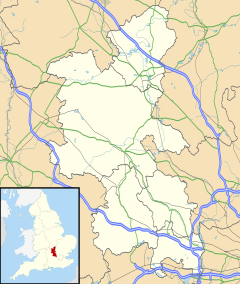Pitchcott
| Pitchcott | |
|---|---|
| Pitchcott shown within Buckinghamshire | |
| Population | 44 (2001 census) |
| OS grid reference | SP7720 |
| Civil parish |
|
| District | |
| Shire county | |
| Region | |
| Country | England |
| Sovereign state | United Kingdom |
| Post town | Aylesbury |
| Postcode district | HP22 |
| Dialling code | 01296 |
| Police | Thames Valley |
| Fire | Buckinghamshire |
| Ambulance | South Central |
| EU Parliament | South East England |
| UK Parliament | |
| Website | Pitchcott Parish Meeting |
Pitchcott is a village and civil parish in the Aylesbury Vale district of Buckinghamshire, England. It is about 3 miles (5 km) northeast of Waddesdon, slightly less than 4 miles (6.4 km) south of Winslow and slightly more than 4 miles (6.4 km) north of Aylesbury. It is in the civil parish of Oving.
The parish is small, covering 925 acres (374 ha). The highest point is Pitchcott Hill, about 510 feet (160 m) above sea level. The village is on the eastern brow of the hill, between about 445 feet (136 m) and 475 feet (145 m) above sea level.
A Roman road called Carter's Lane forms part of the parish's western boundary with Quainton. There is some evidence of Roman occupation south of the village.
Pitchcott is a shrunken village: around the surviving settlement, to the southeast and in other directions, are medieval house platforms and traces of tracks. Southwest of the former parish church is a mound that may have been the base of a medieval windmill. The parish also has good examples of ridge and furrow, showing that in the Middle Ages some of the land now farmed as pasture used to be arable.
In 1927 only about 32 acres (13 ha) were arable and 887 acres (359 ha) was grassland. A transition from arable farming to sheep pasture in previous centuries, aided by enclosure, may explain why Pitchcott village shrank.
The toponym is derived from the Old English for "cottage where pitch is stored". Pitchcott is not named in the Domesday Book of 1086 or in 12th-century records. In 1225 the manor was one fee of the Honour of Wallingford. In 1540 this was merged with the Honour of Ewelme in Oxfordshire, and the last mention of Pitchcott's overlordship dates from 1550.
...
Wikipedia

